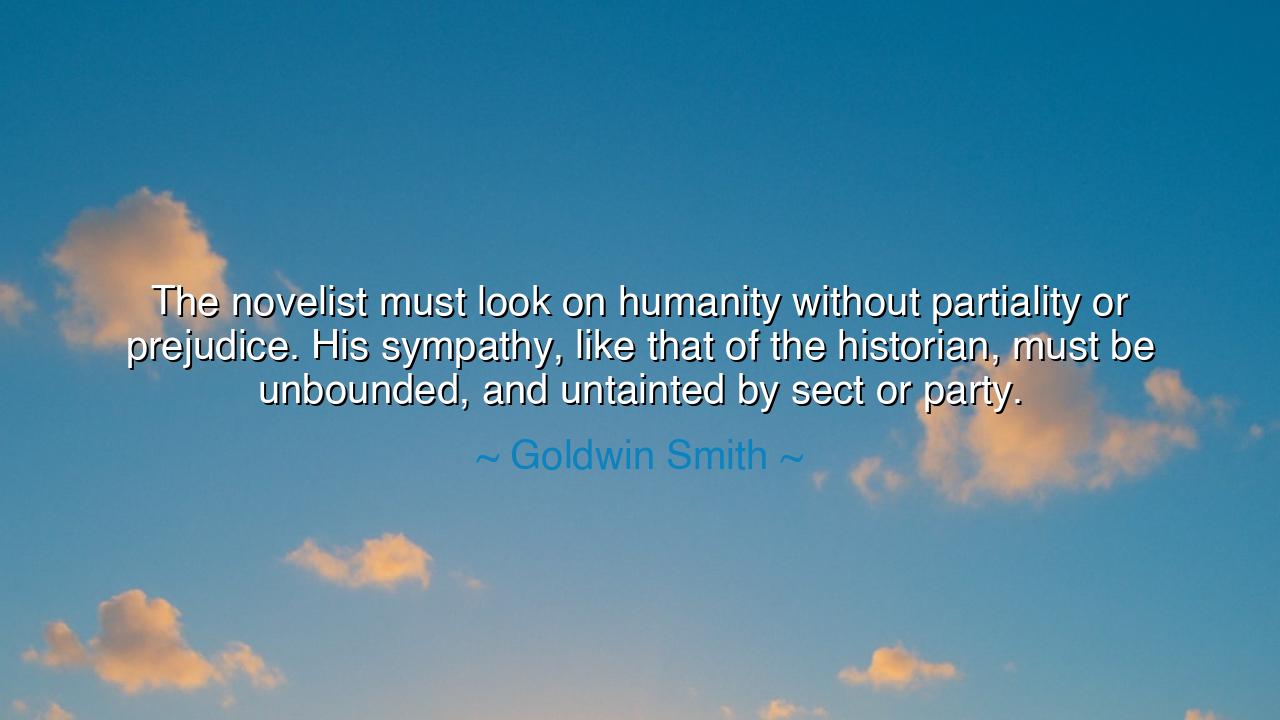
The novelist must look on humanity without partiality or
The novelist must look on humanity without partiality or prejudice. His sympathy, like that of the historian, must be unbounded, and untainted by sect or party.






"The novelist must look on humanity without partiality or prejudice. His sympathy, like that of the historian, must be unbounded, and untainted by sect or party." These words from Goldwin Smith carry a profound lesson for those who seek to create, to write, and to understand the world. In this statement, Smith beckons us to look beyond the limitations of our own biases, to transcend the confines of prejudice, and to view the full spectrum of humanity with a pure heart—much like the historian or philosopher who strives to tell the story of humankind without distorting it through the lens of personal belief or political loyalty.
At the heart of Smith’s message is the necessity of objectivity in the art of writing. The novelist, as a creator of worlds and lifelike characters, must have an eye that sees all, not with judgment, but with the kind of broad-minded sympathy that seeks to understand each individual in their full complexity. To write with such unbounded sympathy is to recognize that no one person or group holds the sole claim to righteousness, nor should the novelist privilege one side of the story over the other. Just as the historian does not rewrite the past to serve a particular agenda, the novelist must resist the temptation to craft narratives that are tainted by sectarian or partisan views. Instead, they must capture humanity in all its glory and failings, its virtues and vices, without bias.
History provides us with many examples of writers who embodied Smith’s principle, casting aside their personal beliefs in favor of a more inclusive perspective. Leo Tolstoy, one of the greatest novelists to ever live, exemplified this kind of detached, yet deeply humane sympathy. In his masterpiece War and Peace, Tolstoy takes a sweeping, panoramic view of the Napoleonic Wars, offering deep insight into the lives of his characters, regardless of their class, nationality, or social standing. He portrays the aristocratic Pierre Bezukhov and the common soldier Andrei Bolkonsky with equal care and understanding, never letting his own prejudices influence his portrayal of their struggles, dreams, and failings. In doing so, Tolstoy elevates the human condition above mere politics or social divisions, recognizing that all people, regardless of their position in society, share the same essential humanity.
In a more modern context, Haruki Murakami, a Japanese novelist, continues this tradition of writing with an untainted sympathy. His works—such as Kafka on the Shore and 1Q84—delve deep into the lives of ordinary people who are often caught in extraordinary circumstances. Murakami’s characters come from different walks of life, but he imbues each one with an equal degree of understanding. His novels do not judge; they only observe and explore. Murakami’s ability to offer a unified, expansive view of humanity, untethered to any specific sect or party, invites readers into a space of universal connection, where all are given the same empathetic treatment.
The message of Goldwin Smith calls us to an ideal that is hard to live up to, yet vital for anyone who wishes to see the world as it truly is. Prejudices—whether based on race, gender, class, or political affiliation—are not easily overcome. They are woven into the fabric of our daily lives, shaped by the societies in which we live and the histories we inherit. However, the novelist’s task is to transcend these narrow divisions and to embrace the complexity of human existence. It is only through this expansive empathy that a writer can create works that do more than simply entertain—they must illuminate the intricacies of the human experience, showing how we are all interwoven in the grand tapestry of life.
The lesson for us, then, is clear: to write with the unbounded sympathy of a great novelist is to approach life with an open heart, free from the constraints of prejudice. As writers, as readers, and as individuals, we are called to adopt a perspective that seeks to understand, rather than judge; to embrace the diversity of human experience, rather than fear it. The world is vast and filled with complexities, and only through the practice of compassionate understanding can we hope to understand one another in our full humanity.
In practical terms, this lesson asks us not only to write with empathy but to live with it as well. When we encounter people who seem different from us—whether in their views, culture, or backgrounds—we must ask ourselves: Are we seeing them through the lens of our own biases, or are we looking at them with the openness of someone who seeks to understand, rather than judge? This is the challenge that faces every writer, every historian, and every individual who dares to seek the truth in the world. By opening our hearts and minds, we can begin to move beyond our limited perspectives and embrace the full complexity of humanity. And in doing so, we will bring ourselves closer to understanding the profound beauty of the world around us.






AAdministratorAdministrator
Welcome, honored guests. Please leave a comment, we will respond soon